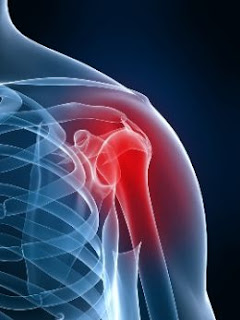
Frozen Shoulder
Also known as Adhesive causalities and Periarthritis. A stiff, painful shoulder with progressive limitation of movement. Sign and symptoms begin gradually, worsen over time. Usually occurs on one side. Sometimes it can spread to the other shoulder. Some idiopathic facts for frozen shoulder-It happens mostly to people aged in 40’s,50’s and 60’s. Women get their frozen shoulder much more commonly than men.
Causes-We can classify in two groups
1) Primary-No significant reason for pain and stiffness.
2) Secondary- may be due to synovitis, rupture of the capsule, subacromial bursitis or a lesion in the muscle complex round the joint particularly in the supraspinatus. There may be history of trauma, your arm in a sling for long time immobilized in a specific position for a prolonged period.
Other ailments are-Heart or lung problems can be linked to cause shoulder pain. Cardiac surgery has sometimes lead to frozen shoulder. Lung problems like tuberculosis or tumor. Diabetes is a common associated condition with frozen shoulder
Symptoms: Symptoms are variable depending on the cause. Pain is the usual presenting feature and may be accompanied by muscle spasm and limitation of movement. The onset can be acute. When the condition is sub acute or chronic, pain and stiffness are most marked after a period of inactivity and may be eased by moderate exercise. Tender areas may be present. Pain often worst at night and when lying on the affected side. Patient has difficulty with normal daily tasks such as dressing, preparing food, carrying bags and working. Muscle wastage may be evident due to lack of use. According to ayuveda- frozen shoulder is known as Ababahuka. Ayurvedda described-80 Types of Vata nanatamaja roja (caused by vitiation of vata dosha). Ababahuka is also a vata nanatmaja roga. Vitiated vata dosha absorbs the fluid (kapha) of the joint cause to Ababahuka.
Treatment-It is essential to carry out a careful clinical examination as many diseases of diverse origin frequently present with musculoskeletal symptoms.
1) Physiotherapy is quite effective in acute condition.
2) Anti-inflammatory drugs.
3) Injection of steroid into the joint to reduce inflammation
4) Nerve block a short term pain relief option
5) Surgery if the above fails
Ayurveda treatment: If frozen shoulder caused by secondary group than the other ailments- the Panchkarma and Kerala therapy is very effective. The aim of the Ayurveda treatment is to bring vitiated vata in equilibrium.
Most popular kerala therapy is pizhichil means squeezing of medicated oil with the help of cotton cloth all over the body with full concentration on shoulder along with different stroke of massage. It is a process of fomentation, highly effective for treating diseases caused by vitiation of vata dosha. Duration of treatment varies according to the severity of symptoms of the patient.
Elakizhi: Special herbal pack massage with Pizhichil gives strength to the muscle and improves the mobility of shoulder joint.
Nasyam: popular panch karma therapy for all urdhvajatrugata roga, It is a powerful rejuvenating therapy.
Requirement of Therapy -7,14,21 days therapy course depending on the severity of symptoms along with oral medicines for 3-4months.
Oral medication –some of them are
Sahacharbaladi kshayam
Valiya rasnadi kashyam
Dhanwantharam kashayam
Saptasaram kashyam
Balarishtam
Dhanwantharishtam
Cheriya Rasnadi kashayam
Gograj gugulu
Punarnavadi guggulu.
Medicated Ghritam- for internal snehana.

